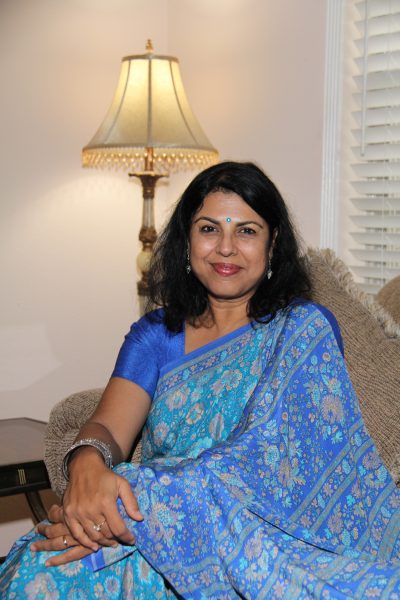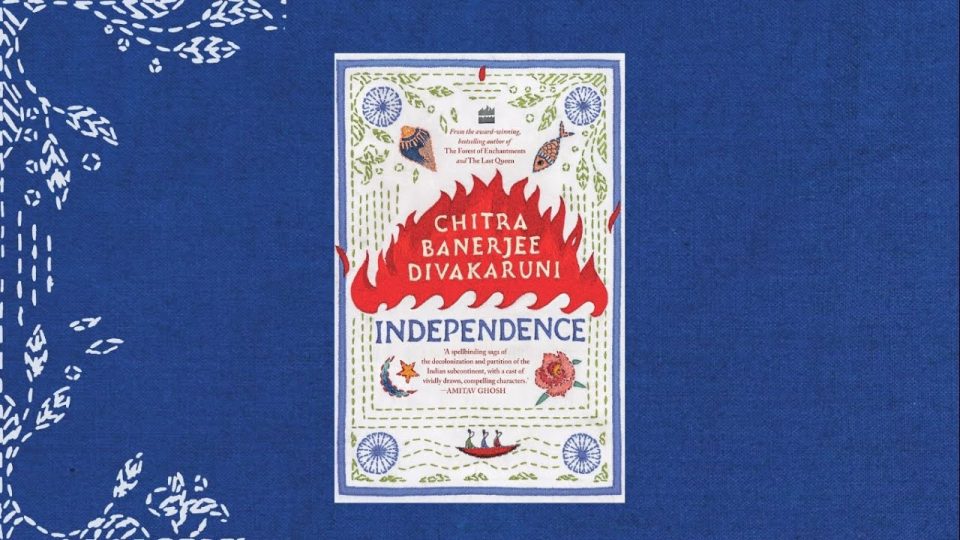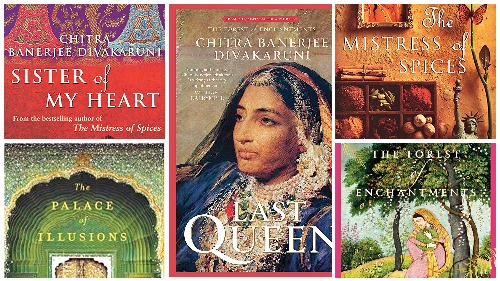
Strong women are often written out of history: Chitra Banerjee Divakaruni

Chitra Banerjee Divakaruni’s latest historical fiction Independence (HarperCollins India) is the story of the three Ganguly sisters, who see India through their own lens and desires, in the backdrop of India’s Independence, the Partition and the political and social upheaval.
Set in a village near Kolkata, this compelling page-turner is also about dreams, love, heartbreak, filial bonds and is a departure from Divakaruni’s previous three books where she focused on three different female characters: Draupadi, Sita and Rani Jindan Kaur.
The award-winning author, teacher and activist has 21 books to her credit, largely set in India and the US. Her books have been translated into many languages, some made into films (The Mistress of Spices and Sister of My Heart). She teaches creative writing at the University of Houston. Divakaruni is currently in India on a book tour. In this interview to The Federal, she talks about the genesis of the novel, Independence, the value of multiculturalism, and more. Excerpts:
What was the starting point for your latest book Independence and the inspiration for the main characters, the three sisters?
The starting point lies in the stories my grandfather and mother told me when I was growing up, inspiring stories of the fight for freedom as well as harrowing tales of communal violence that accompanied Partition. I had been thinking of them, on and off, for a while — more so as I saw those generations who had actually experienced India’s Independence passing away. It imbued the subject matter with an added urgency for me to tell this story. The part about the three sisters was my fictional input. I wanted a folk tale-like quality to the novel as well as stark history. So, like many folk tales of Bengal, mine too begins with the idea that once there were three sisters, each very different from the others.
Novels about the Partition seem to be the flavour of the season after Gitanjali Shree’s Tomb of Sand won the 2022 International Booker Prize. Was Independence planned for release to coincide with India’s 75th independence anniversary?
I started writing Independence long before Shree’s wonderful Booker Award, but yes, with the 75th Independence anniversary coming up, I had been thinking a lot about the meaning of independence, and where India stands today. Once I started the novel and had a good sense of where it was going and how long it might take me to finish it, the publisher and I decided it would be meaningful to coincide publication with the 75th anniversary — a kind of tribute to the freedom fighters.
Also read: ‘The Song of the Cell’ review: Understanding life in terms of its simplest unit
Is Independence, in a way, a sequel to your 2021 novel, The Last Queen, the story of a brave Maharani? Did you consciously title the book to reflect the independence of our country as well as of the three women?
Yes, to both. Maharani Jindan Kaur’s story ends with the triumph — at least externally — of the British, though her resistance, until literally her last breath, I believe, is inspiring and valuable. But I could not leave the matter there. I had to trace the end of the British rule in India, when she threw off the colonial yoke. Thus, Independence. And yes, I named the book Independence to reflect the larger political definition of the term as well the intimate personal one. I feel that the two are intrinsically related.

The Hindu-Muslim marriage between Deepa and Raza in the book caused a furore and understandably so given the tumultuous Partition days. Now, 75 summers later, it is no different in India with Hindu-Muslim couples consistently targeted. Your thoughts?
There has been a troubling backlash, in recent years, regarding Hindu-Muslim relations, including — but not confined to — marriages. In Independence, I remind my readers that Hindus and Muslims fought side by side in order for our country to achieve her freedom from the British yoke. That the songs of Nazrul Islam and the songs of Rabindranath Tagore both inspired the freedom fighters. I hope they will think deeply about these facts and come to their own conclusions about the value of multiculturalism in India today.
All the chapters in the book are titled after the names of the three sisters which intrigued me. Any reason for doing so?
The book interweaves the lives and loves of three women, Priya, Deepa and Jamini, through whom I tell the story of India. They each understand “independence” in a different way, and each follows a different destiny. So, it was important for me to give them equal space. I do have a favourite among them, but I’m not telling who it is! I want readers to come to their own conclusions and choose their own favourites.
Independence brings to mind Louisa May Alcott’s famous book Little Women, the story of the four girls, their struggle to conform to society’s norms as also between familial duty and personal growth. Was your book inspired or in some way influenced by Little Women?
No, though I like Little Women a great deal and read it several times when growing up, I did not have it in mind, at least not consciously. My model was the folktales of Bengal, which often begin, “Once there lived three sisters,” and then proceed to tell us how they are different from each other and how they each want something different — and how that leads to their different adventures.
Also read: How Indian queens across history scripted stories of valour and victory
What did it entail to recreate the Bengal of the 1940s and the stories related to the freedom struggle?
I’ve already mentioned the family stories. In addition, I researched documents of the time, especially newspapers and photographs (including harrowing ones of the communal riots as well as the Partition trains). I read letters and speeches by politicians. The life of Sarojini Naidu was of particular interest to me. She was a woman who worked very hard and faced many dangers and was incarcerated, but we seem to have forgotten her — as we’ve forgotten other women who fought (and died) to bring us freedom.
Female characters and strong ones at that — Draupadi, Sita, Korobi and Jindan, to name a few — inhabit your books. Any reason for the prominence of women with strong minds/values?
I feel that for centuries women in literature have been pushed to the margins, or interpreted through a male gaze that favours compliance and punishes independent thinking (as in our two major epics). And strong real-life women have often been vilified or written out of history. I feel a strong need to redress that imbalance. Perhaps the impulse comes out of my activist work with women.

How challenging is it as an Indian immigrant in the US to write India-related stories and Indian characters even if fictional?
Writing is always challenging, especially if you decide to challenge norms! Two things were difficult for me:
- Because I was living and publishing in the US (as well as in India), people were often upset when my work focused on social ills related to Indian or Indian-American women. There was a sense that I was “betraying” the community’s secrets. But a writer has to write the truth as she sees it, so I had to continue in spite of criticism. For instance, I got a lot of push back when in my novel Sister of My Heart,I wrote about the use of amniocentesis in India to determine the sex of the foetus, often leading to abortion of female foetuses.
- When I wrote lyrically about the things I loved about India, things from my childhood — the colours, the monsoons, the joint family structure, the food — I was accused of exoticizing the culture for the western gaze. But I was only writing things that were true to my experience, so I continued doing it.
A related problem was that my agent was not sure what kind of market there would be for my writing in the US. She urged me to write more contemporary themed books rather than historical and mythological—but I strongly felt a writer must write what she is inspired by.
After some time, the critical voices lessened and my books began to be accepted, admired and taught in schools and colleges in many countries. Slowly, my regular readership expanded in both India and USA, and my agent saw that there was indeed an enthusiastic reception to the books and became more enthusiastic herself about finding them supportive publishers. Today, our community both in India and the USA is much more secure and open to the ideas in my books, which are probably doing better than ever before. I am very thankful for that.
Also read: What has led to the great resurgence of literature from Japan
From stories about South Asian immigrants will your focus shift to historical events, Indian epics, current politics, strong inspirational women?
Every book surprises me. I can never predict what kind of idea will take hold of me! I hope I will write all of the above!
How do you perceive films made out of your books?
The Palace of Illusions, The Last Queen and Independence have all been optioned. I am excited to see what might happen. I think a good director can amplify the reach of a book, so I am enthusiastic although maybe just a little concerned as I wait to see what form the films might take.
Independence, too, is a compelling story with history, family drama and interesting characters lending itself admirably to screen adaptation. Any interest from filmmakers?
Yes, the book has been optioned by Temple Hill. They are interested in possible Indian collaboration, which I would love as there is so much great talent in the Indian film industry today among both directors and actors.
Writers continue to face threats worldwide, including in India, for writing the truth in today’s political climate. Your thoughts?
It comes with the territory. I wish it was not so. I commend many brave writers who continue to write about dangerous truths. As for my own work, I hope readers see that the controversial issues in them arise out of a love for my culture and history and a desire to make people think about how to make the societies I write about the best that they can be. I feel particularly strongly that women must be allowed the best possible chances, and allowed to live lives of dignity and independence. This can only strengthen the overall culture. After all, even Manu has said that in a country where women are respected, the gods are pleased. (I have used his quotation as the epigraph of my novel Before We Visit the Goddess).
What are you working on currently and when can we expect the book to be out?
I am branching into non-fiction and writing an inspirational biography. More will be revealed about this at the right time.

